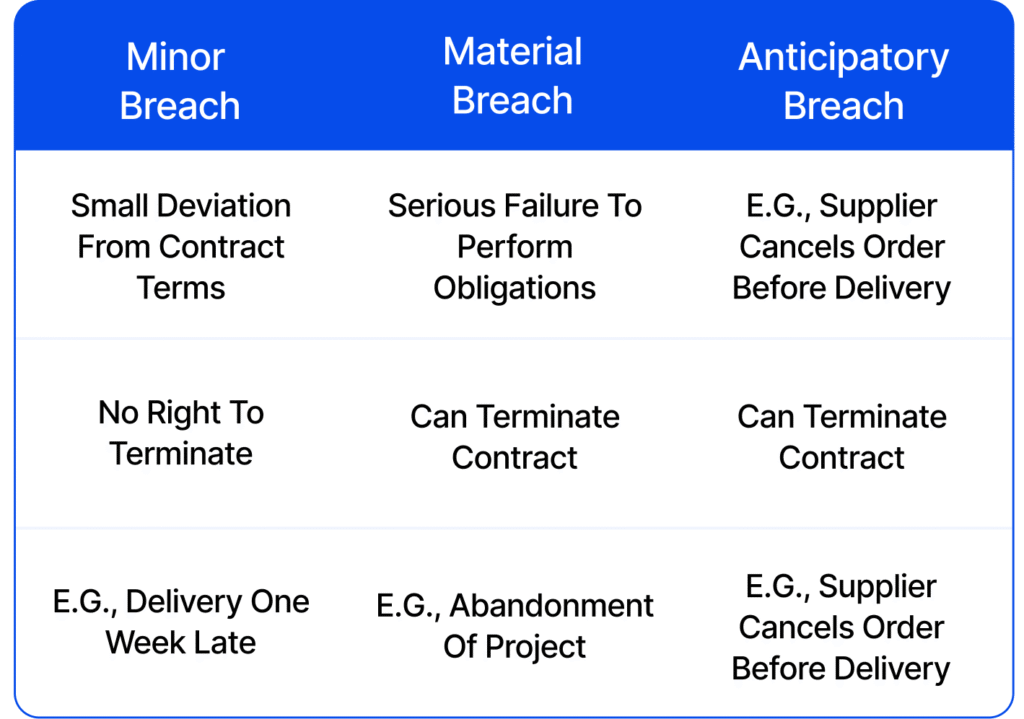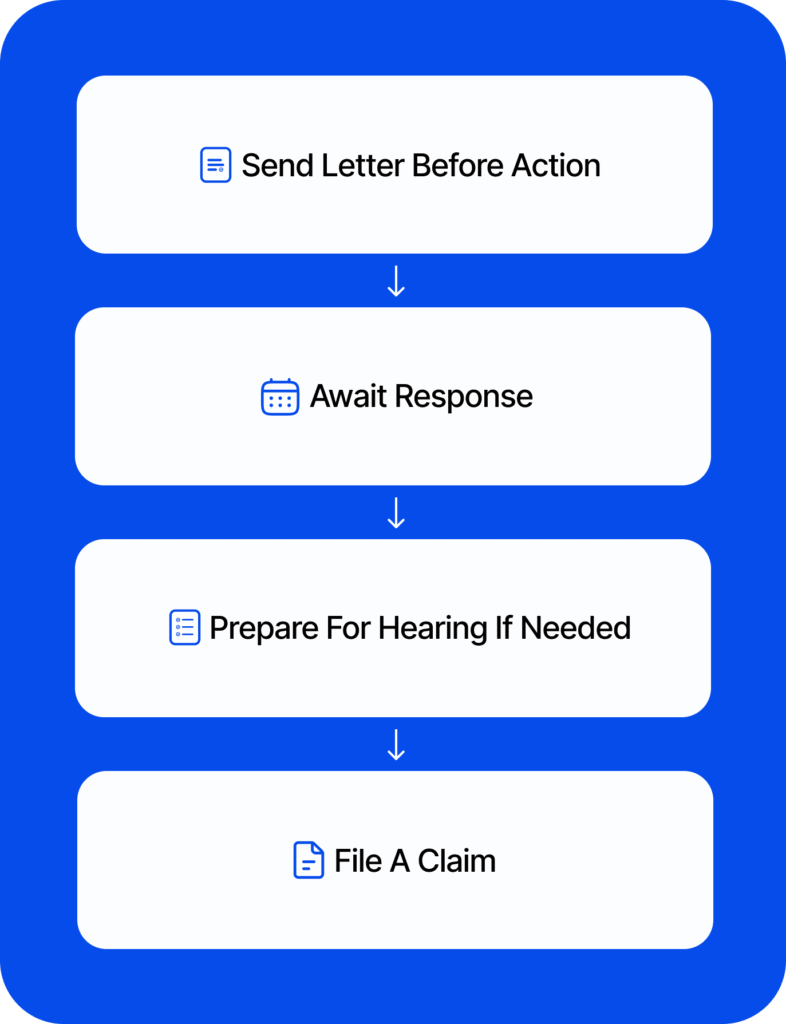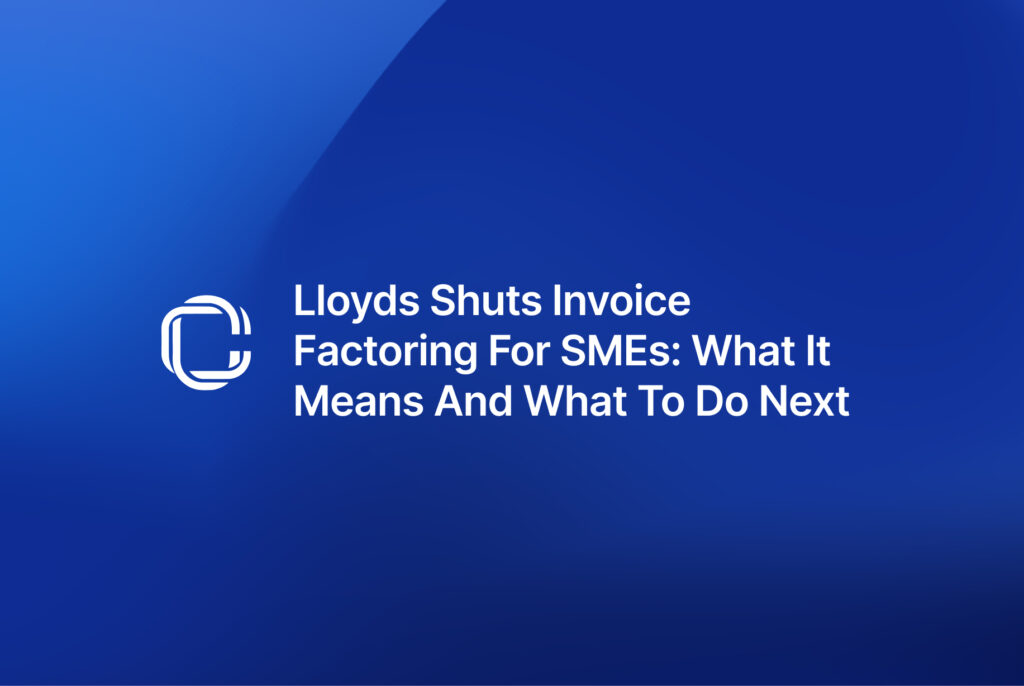Learn what counts as a breach of contract in UK law, the main types of breach, examples, and your legal options to claim compensation.
A breach of contract happens in the UK when a person or business fails to honour the obligations they promised in an agreement. Understanding what constitutes a breach of contract is essential because the type of breach, minor, material, anticipatory, or actual, affects what remedies you can seek. In this guide, we explain the legal elements you need to prove, provide real‑world breach of contract examples UK readers encounter in small claims, outline the remedies available, and show you how CaseCraft.AI helps you file a breach of contract claim through the small claims process. You’ll learn about types of breach of contract, the evidence required, and common defences, all using up‑to‑date (2025) legal principles.
Introduction
Contracts underpin almost every transaction in modern life, whether you hire a web designer, order bespoke furniture, or sign up for a subscription service. When one party does not perform as promised, the law in England and Wales views this as a breach of contract; UK lawyers call it a broken agreement or failure to perform. Understanding what constitutes a breach of contract before bringing a case helps you decide whether to make a small claim, negotiate a settlement, or simply accept an apology.
Many people think contract law is arcane, but the principles are straightforward: if there’s a valid contract and someone fails to do what they agreed, you may have a claim. This article demystifies the process by examining breach of contract examples UK consumers and small businesses face, such as a service not being provided or defective goods. We explain types of breach of contract, such as minor, material and anticipatory breaches, and discuss your rights to compensation or other legal remedies.
This guide offers practical support, explains how to gather evidence, and highlights how CaseCraft.AI guides you through the damages claim process in the UK for small claims. If you believe a service provider or business has failed to meet their contractual obligations, CaseCraft.AI can help you assess your claim and prepare your case.
What Is a Breach of Contract?
A breach of contract in UK law occurs when one party fails to perform, performs defectively, or indicates that they will not perform their obligations under a valid agreement. Under English contract law, a contract can be written, verbal, or implied from conduct; for instance, paying for a service implies an agreement that the service will be provided satisfactorily. In small claims, contracts often arise in everyday settings such as consumer purchases, services for businesses, and employment agreements.
In practice, a breach can be a failure to pay, a late delivery of goods, providing services of poor quality, or refusing to complete work. Some breaches are minor and allow the contract to continue, while others are so serious that they give the innocent party the right to terminate the contract and claim damages. To determine what constitutes a breach of contract and whether you have grounds for a breach of contract claim, the law considers the obligations, the nature of the breach, and the impact on the non‑breaching party.
Small claims courts (also called the small claims track of the county court) deal with low‑value contract disputes. Although £10,000 is the general upper limit, it is not a strict cap. Claims between £10,000 and £25,000 may go on the fast track. If your dispute is worth under £10,000 and involves a breach of contract claim, CaseCraft.AI’s automated platform can help you prepare and file your case quickly.
The Legal Elements of a Breach
To succeed in a breach of contract claim, you must prove three legal elements on the balance of probabilities, the standard of proof in civil cases. These elements are:
- Existence of a valid contract: You need to show that a contract existed. Contracts can be written, verbal or implied by conduct. A written contract or signed terms and conditions often make this easier to prove. However, even an oral agreement can constitute a valid contract if you can evidence the parties’ intentions and the essential terms.
- Specific term breached: The defendant must have breached a specific term of the contract. A term can be expressed (written or spoken) or implied. Implied terms may arise from legislation (such as the Consumer Rights Act requiring goods to be of satisfactory quality), custom, previous dealings, or to make the contract workable. Clarify which obligation was not performed or was performed defectively.
- Loss or damage caused by the breach: You must show that the breach caused you to suffer loss or damage. Losses can include the cost of obtaining the goods or services elsewhere, the loss of revenue or time, and any consequential losses that were reasonably foreseeable.
Balance of probabilities
In the small claims court, you must satisfy the judge that it is more likely than not that the contract existed, that it was breached, and that the breach caused you loss. This standard, the balance of probabilities, means that if the judge is uncertain, your claim fails. Therefore, keeping good evidence and documenting your communications is vital.
You can learn more about how to gather and present evidence in our guide on how to make a breach of contract small claim.
Types of Breach of Contract in the UK
Not all breaches are equal. Understanding the types of breach of contract helps you assess the seriousness of the failure and the remedies available. In English law, breaches are generally categorised as minor (partial), material or fundamental, anticipatory, and actual. Each has different consequences. The chart below visually compares these types:

Minor (Partial) Breach
A minor breach of contract UK claims arises when the breach is relatively small and does not destroy the purpose of the contract. For example, delivering goods a week late or completing a service slightly over budget. The contract continues, but you may be entitled to recover breach of contract damages for the inconvenience or additional costs. Minor breaches are often resolved with a small refund or price reduction.
Material or Fundamental Breach
A material breach in the UK happens when a serious failure goes to the heart of the contract. It undermines the entire purpose of the agreement and substantially deprives the innocent party of the expected benefit. An example might be a contractor abandoning a project halfway through or delivering an unusable website. Courts consider factors such as the extent of the breach, its impact, good faith, opportunities to remedy, and any contract provisions regarding termination. A material breach often allows termination and a full refund, as well as compensation for losses caused by the breach.
Anticipatory Breach
An anticipatory breach contract arises when one party indicates in advance that they will not perform their obligations. For instance, a supplier notifies you that they won’t deliver the ordered goods before the delivery date. Under English law, you can treat this as a breach when the repudiation is clear and unequivocal. You may elect to terminate the contract immediately and seek damages or wait and see whether the party performs. Because anticipatory breach leaves you uncertain about the outcome, it is often prudent to notify the other party and record their response.
Actual Breach
An actual breach occurs when the agreed-upon time for performance has passed and the promised work has not been carried out. A common example is paying for a service that is never provided. If a builder fails to start work by the agreed date or an online subscription renews without giving you access to the service, the failure to perform constitutes an actual breach. In small claims, this type often arises when a business collects payment but delivers nothing. For more guidance on this scenario, see our article on service not provided.
A breach can also be classed as a repudiatory breach when it is so serious that it entitles the innocent party to terminate the contract and claim damages. Repudiatory breaches are similar to fundamental breaches and may overlap.
Common Examples of Breach of Contract
Many breach of contract examples UK readers encounter involve everyday transactions. Here are some typical scenarios:
- Service not provided breach: You paid for a service, such as a web design, photography, or home renovation, and the provider never started or completed the work. This is both an actual and potentially fundamental breach. Under consumer law, you have the right to a repeat performance or price reduction.
- Business failing to meet agreed standards or deadlines: A graphic designer delivers a logo weeks late and far below the quality promised. Late delivery and defective performance can be minor or material breaches depending on the impact on your business.
- Supplier delivering defective goods: A retailer sends you goods that are damaged or not as described. Under the Consumer Rights Act, goods must be of satisfactory quality, fit for purpose, and as described. Failing to meet these implied terms constitutes a breach.
- Employer withholding a contractually promised bonus: Employment contracts are binding, and if an employer promises a bonus or commission and fails to pay, this can be a breach. For claims under £10,000, you can use the small claims court to pursue unpaid wages or bonuses.
- Subscription auto‑renewed without consent: A subscription service renews without your consent and fails to provide access. This may be a breach of the terms and also an unlawful subscription dispute. See our guide on subscription disputes for details.
When evaluating whether a breach is minor, material, or fundamental, consider how seriously it interferes with your contractual expectations. For instance, a late delivery of perishable goods may be a material breach because the goods become useless, while a late delivery of non‑perishable goods may be minor.
What Constitutes “Service Not Provided” as a Breach
In consumer and business contracts, a service not provided breach is one of the most common grounds for a claim. Non‑performance means the service provider failed to deliver the service altogether. Unless there is a legitimate reason, such as impossibility or mutual agreement, failure to provide the agreed service constitutes a breach and entitles you to compensation or a refund. When a trader fails to meet required standards, the consumer has a right to repeat performance or a price reduction.
Examples include:
- A cleaning company takes payment but never shows up. Despite repeated reminders, they fail to provide any service. You can claim a refund and damages for any additional cleaning costs.
- An online course promises lifetime access but never grants you login credentials. This is a non‑delivery of the digital product and a breach of the implied terms that the service will be provided as described.
Consumers often worry that a small claim is too expensive or time‑consuming. In reality, you can file a breach of contract claim for non‑performance through the small claims court, and CaseCraft.AI simplifies the process. We prepare the court forms to HMCTS standards, provide step‑by‑step guidance, and our success‑based pricing means you only pay a fixed fee upfront and a percentage of your recovery if you win.
Remedies for Breach of Contract
When a contract is broken, the law provides remedies to put you, as far as money can, in the position you would have been in had the contract been performed. The most common remedies in small claims are damages, specific performance, termination, refunds, and interest on money owed.
Damages (Compensation)
Damages are monetary awards intended to compensate you for losses caused by the breach. The court assesses damages based on direct losses (the cost of rectifying the breach) and consequential losses (such as lost profits) that were reasonably foreseeable when the contract was made. In small claims, damages are typically limited to your actual financial loss and may not include distress or inconvenience.
The general principle is to put you in the position you would have been in if the contract had been performed. For example, if a builder fails to install a kitchen correctly and you pay another builder to fix it, you can claim the cost difference as damages. When claiming, keep receipts, invoices, and records of all additional costs.
Specific Performance
Specific performance is an equitable remedy where the court orders the breaching party to fulfil their obligations. It is rarely granted in small claims because damages usually suffice. However, it might be appropriate where the subject matter is unique, such as a contract for a rare piece of art or a bespoke piece of software, and damages would not provide adequate compensation. You can ask for specific performance in your claim, but the court has discretion to refuse it.
Termination and Refunds
For termination of contract UK disputes, you may cancel the contract and recover any money you paid if the breach is fundamental or repudiatory. This effectively brings the contract to an end and allows you to claim back sums already paid plus damages for any losses. Under consumer law, you may also have a statutory right to a refund within a set period (e.g., 14 days for distance selling). Always check the specific terms of your contract and statutory rights.
Interest on Money Owed
If someone owes you money under a contract, you may claim interest from the date the debt became due. For non‑commercial debts, the court usually applies an 8% annual rate unless the contract stipulates a different rate. To calculate interest, multiply the amount owed by 0.08 and divide by 365 to get daily interest, then multiply by the number of days overdue. Keeping accurate records of when payments were due and when you sent reminders will help you calculate your claim.
How to Prove a Breach of Contract
Evidence is the backbone of any breach of contract claim. You need to demonstrate what was agreed, what went wrong, and the losses you suffered. Good evidence includes:

- Signed or verbal agreement: The contract itself, whether in writing or oral, is crucial. If verbal, record the date, location and substance of the conversation and any witness who heard it.
- Proof of payment or performance: Receipts, invoices, bank statements or proof of work done (such as photos or delivery notes).
- Emails, messages and correspondence: Written communications, including email threads, text messages, letters or notes of meetings, show what was promised and how the other party responded to complaints.
- Timeline: Create a clear timeline of events, from entering the contract to the breach and subsequent communications. Include dates of correspondence, reminders sent, and deadlines missed. This helps the court understand the sequence and measure the delay or failure.
How to File a Breach of Contract Claim
Filing a breach of contract claim in the small claims court involves several steps. CaseCraft.AI streamlines these tasks, but it is helpful to understand the process. Here is a step‑by‑step timeline:

- Send a Letter Before Action (LBA): Before issuing a claim, you must send the other party a formal letter outlining the breach, the remedy you seek (e.g., payment of £X), and a deadline to respond. This letter shows you attempted to resolve the matter amicably. It must be clear, concise and polite.
- File the claim through the government portal: If the other party does not respond satisfactorily, you can file your claim online using the government’s claim portal. The small claims procedure is designed to be accessible, but the forms can be technical. CaseCraft.AI prepares these court documents automatically, ensuring they meet HMCTS standards.
- Pay the court fee: Court fees depend on the value of your claim. For claims under £300, the fee is modest; for higher amounts up to £10,000, the fee increases. You can recover the fee from the defendant if you win.
- Await response and mediation: After filing, the defendant has 14 days to respond. They may admit the claim, pay, partially admit, or file a defence. The court will usually refer you to mediation to try to settle. Mediation is free for small claims and often leads to an agreement.
- Prepare for a hearing: If mediation fails, the court schedules a hearing. You will need to prepare a witness statement, assemble evidence, and possibly attend a remote or in‑person hearing. CaseCraft.AI helps you track deadlines and organise your documents so you feel confident.
Common Defences Against Breach of Contract Claims
Defendants may raise several defences to avoid liability. Understanding these helps you anticipate objections and strengthen your case:
- No valid contract existed: The defendant may argue that there was no contract because essential terms were not agreed upon or because the contract was void or unenforceable.
- Performance was substantially complete: Even if there was a defect, the defendant may claim substantial performance, that they performed most obligations and any breach is minor, meaning you cannot terminate the contract but can only claim a price reduction.
- Force majeure or frustration: External events beyond the parties’ control (e.g., natural disaster, pandemic) may excuse performance. The doctrine of frustration applies if the contract becomes impossible or illegal to perform. Force majeure clauses in the contract may also limit liability.
- Misunderstanding or lack of agreement on key terms: If the parties misunderstood each other and there was no consensus ad idem (meeting of minds), the contract may be invalid.
- Limitation period expired: Under the Limitation Act 1980, you must bring a claim for breach of a simple contract within six years of the date the cause of action accrued. If you wait too long, your claim is barred.
Knowing these potential defences can help you prepare evidence to counter them. For example, include correspondence showing that both sides agreed on the terms, or evidence that there were no extenuating circumstances preventing performance.
FAQs About Breach of Contract
What qualifies as a breach of contract in the UK?
A breach occurs when one party fails to perform or performs defectively under an agreement, whether the contract is written, verbal, or implied. The breach can be minor, material, anticipatory, or actual, and the remedy depends on the type and seriousness of the breach
Can I sue someone for not providing a service?
Yes. If you paid for a service that was never delivered or delivered so poorly that it defeats the purpose, you can sue for a service not provided breach. You should first send a letter before action, then file a claim. You can claim damages or a refund.
What evidence do I need to prove breach of contract?
You should provide the contract (written or verbal details), proof of payment, emails or messages, invoices, receipts, photos and a timeline of events. This evidence shows what was agreed, how it was breached, and the loss you suffered.
What is the difference between material and minor breach?
A material breach in the UK is a serious failure that goes to the heart of the contract, allowing termination and full compensation. A minor breach is a small deviation that does not destroy the purpose of the contract; the contract continues, and damages may be limited.
How much compensation can I claim for breach of contract?
Compensation (damages) aims to put you in the position you would have been in had the contract been performed. In small claims, you can claim direct and foreseeable losses. The small claims limit is generally £10,000. You may also claim interest at 8% per year.
Can I bring a breach of contract claim to small claims court in the UK?
Yes. If the amount you’re claiming is £10,000 or less, you can usually bring your breach of contract claim to the small claims court. It’s a quicker, lower-cost process designed for individuals, freelancers, and small businesses seeking straightforward resolutions.














